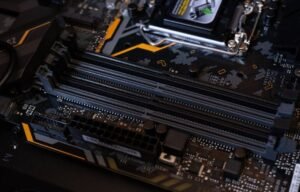Is AI Software Engineering?
Artificial intelligence (AI) has been making significant strides, revolutionizing various industries and influencing decision-making processes. As AI continues to advance, there is a growing debate about whether AI can be classified as software engineering. Let’s explore this topic further and shed some light on whether AI and software engineering go hand in hand.
Key Takeaways:
- AI is a subset of computer science that focuses on simulating human intelligence.
- Software engineering involves designing, developing, and maintaining software systems.
- While AI utilizes software engineering principles, it also encompasses specialized techniques and algorithms.
- AI development requires a deep understanding of mathematics, statistics, and computational algorithms.
- AI software products often involve continuous learning and adaptation.
The Relationship Between AI and Software Engineering
AI, at its core, is a field of computer science that aims to create intelligent machines that can perform tasks that typically require human intelligence. *AI systems rely heavily on software engineering principles* for their development, as they require the design and implementation of algorithms, data structures, and software architectures. However, AI extends beyond traditional software engineering by incorporating specialized techniques such as machine learning, natural language processing, computer vision, and more.
One interesting aspect is that AI development often involves *continuous learning and adaptation*. AI algorithms and models can evolve and improve over time based on the data they receive and the feedback loop built into the system. This iterative nature sets AI development apart from conventional software engineering practices where the software is typically developed and released as a stable product.
AI vs. Traditional Software Engineering
Although AI utilizes software engineering principles, there are notable differences between AI development and traditional software engineering. Unlike traditional software, AI systems often deal with *uncertain and changing environments*, requiring models that can handle and adapt to variability. Traditional software engineering focuses on building reliable and predictable systems, while AI encompasses probabilistic modeling, prediction, and decision-making in uncertain situations.
In traditional software engineering, developers aim to build systems with *clearly defined requirements and established specifications*. On the other hand, AI development involves creating systems that *learn from data and improve performance* by capturing patterns and making intelligent decisions based on that information. This adaptability and learning capability are at the core of AI software development, setting it apart from traditional software engineering approaches.
Data Science and AI Software Engineering
Data science plays a crucial role in AI software engineering. *To build effective AI systems, data scientists analyze and process large amounts of data*, train models, and fine-tune algorithms. Data science provides the foundation for AI development by enabling the extraction of meaningful insights from data, the identification of patterns, and the creation of predictive models.
In a rapidly evolving technological landscape, the intersection of AI and software engineering continues to reshape industries and drive innovation. As AI technology advances and becomes more ingrained in our everyday lives, understanding the relationship between AI and software engineering becomes increasingly important.
Comparison of AI and Software Engineering
| AI | Software Engineering |
|---|---|
| Focuses on simulating human intelligence | Focuses on designing, developing, and maintaining software systems |
| Utilizes specialized techniques like machine learning and natural language processing | Relies on established software engineering principles and practices |
| Requires a deep understanding of mathematics, statistics, and computational algorithms | Requires expertise in software development methodologies and best practices |
Future Outlook
Looking ahead, the integration of AI and software engineering will likely become even more intertwined. The continuous advancements in AI technology and the growing reliance on intelligent systems to solve complex problems suggest that AI software engineering will be a prominent field. As AI continues to evolve, it will further push the boundaries of traditional software engineering practices, requiring engineers to adapt and acquire new skills to succeed in this increasingly AI-driven world.
References
- “AI Vs. Software Engineering: What’s the Difference?” by Gina Bennett, Udacity Blog
- “Is AI the New Software Engineer?” by Dr. Ganapathi Pulipaka, Forbes

Common Misconceptions
Misconception 1: AI Software Engineering is the same as traditional software engineering
One common misconception is that AI software engineering is just a variation of traditional software engineering. However, there are significant differences between the two.
- Traditional software engineering focuses on developing software applications that follow a set of predefined rules and logic, while AI software engineering involves creating algorithms that can learn and improve over time.
- AI software engineering often requires advanced mathematical and statistical knowledge, as it involves analyzing large amounts of data and making predictions based on patterns and trends.
- In traditional software engineering, the goal is to build systems that perform specific tasks efficiently. In contrast, AI software engineering aims to create systems that can mimic human intelligence and make autonomous decisions.
Misconception 2: AI can replace human software engineers
Another misconception is that AI software engineering can completely replace human software engineers. While AI can automate certain aspects of the software engineering process, human software engineers are still essential for various reasons.
- Human software engineers possess critical thinking and problem-solving skills that AI currently cannot replicate. They can navigate complex software development challenges that require creativity and intuition.
- AI software engineering still requires human involvement in areas such as defining the problem, setting objectives, and validating the results. These tasks require human judgment and domain expertise.
- Human software engineers are responsible for the ethical considerations and social impacts of AI systems. They can ensure AI algorithms are unbiased and fair, whereas AI systems alone may perpetuate existing biases or discrimination.
Misconception 3: AI software engineering is only relevant for advanced industries
Some people believe that AI software engineering is only applicable in advanced industries such as autonomous vehicles or robotics. However, AI has numerous applications across various sectors.
- AI-powered chatbots and virtual assistants are widely used in customer service and support to handle routine inquiries and tasks.
- AI algorithms are employed in healthcare systems to analyze medical imaging data for faster and more accurate diagnoses.
- AI is used in e-commerce platforms to personalize product recommendations based on user preferences and browsing history.
Misconception 4: AI software engineering is about creating superintelligent machines
Many people associate AI software engineering with creating superintelligent machines that can surpass human intelligence. However, the goal of AI software engineering is not necessarily to achieve superintelligence.
- AI software engineering focuses on developing AI systems that can automate specific tasks, improve efficiency, and enhance decision-making processes.
- The field also aims to create AI systems that can understand and respond to human language, recognize patterns in data, and make predictions based on historical information.
- While there is ongoing research on achieving artificial general intelligence (AGI), which would resemble human intelligence across a wide range of domains, it is a separate and more complex field than AI software engineering.
Misconception 5: AI software engineering will lead to widespread job loss
There is a widespread fear that AI software engineering will lead to mass job displacement. However, this assumption overlooks the potential positive impacts of AI and fails to recognize the new opportunities it can create.
- AI technology can augment human capabilities, allowing software engineers to focus on more complex and innovative tasks. It can automate repetitive and mundane aspects of software development, freeing up time for engineers to engage in more creative problem-solving.
- The demand for skilled AI software engineers is increasing rapidly. With the advancement of AI technology, there is a need for experts who can develop, deploy, and manage AI systems effectively.
- While certain roles may evolve or become automated, AI software engineering can also pave the way for new job opportunities in fields such as machine learning, data analysis, and AI ethics.

Is AI Software Engineering?
The field of Artificial Intelligence (AI) has gained significant attention in recent years and has become an integral part of various industries. However, the question arises: Is AI software engineering? Let’s explore some interesting facts and figures related to AI that showcase its engineering-like aspects.
AI vs. Traditional Software Development Comparison
Comparing AI development with traditional software development methodologies helps understand the distinctive qualities of AI as a software engineering discipline.
| Aspects | Traditional Software Development | AI Development |
|---|---|---|
| Input | Fixed requirements | Vast amounts of data |
| Output | Expected results | Desired patterns and insights |
| Processing | Algorithmic calculations | Machine learning algorithms |
| Adaptability | Less flexible | Dynamic learning and adaptation |
| Decision Making | Predefined logic | Based on patterns and probabilities |
AI Applications in Various Domains
AI has found applications across multiple domains, improving efficiency and revolutionizing different industries.
| Domain | Application |
|---|---|
| Healthcare | Medical diagnosis and drug discovery |
| Finance | Fraud detection and algorithmic trading |
| Transportation | Autonomous vehicles and route optimization |
| Education | Personalized learning and intelligent tutoring systems |
| Retail | Recommendation systems and demand forecasting |
Impacts of AI on Employment
The rise of AI technology has raised concerns about its impact on job markets and employment rates.
| Aspect | Impact |
|---|---|
| Automation | Replacing repetitive and mundane tasks |
| Augmentation | Enhancing human abilities and decision-making |
| Creation | Generating new roles and job opportunities |
| Transition | Requiring reskilling and upskilling for certain jobs |
| Ethical considerations | Facilitating discussions on responsible AI use |
AI Software Development Life Cycle
Like traditional software engineering, AI development follows a systematic life cycle.
| Phase | Description |
|---|---|
| Problem Identification | Defining the AI problem and objective |
| Data Collection | Gathering relevant data for training models |
| Model Development | Creating AI models and algorithms |
| Model Evaluation | Testing and validating the AI models |
| Deployment | Integrating the AI solution into production |
Types of AI Algorithms
AI algorithms form the core of AI systems, enabling various capabilities and functionalities.
| Algorithm | Description |
|---|---|
| Supervised Learning | Classifying data based on labeled examples |
| Unsupervised Learning | Discovering patterns and relationships in unlabeled data |
| Reinforcement Learning | Learning through interaction with an environment |
| Deep Learning | Simulating human neural networks to process complex data |
| Natural Language Processing | Enabling machines to understand and respond to human language |
AI Ethics Framework
With the increasing integration of AI into society, ethical considerations have become crucial in its development and use.
| Ethical Principle | Description |
|---|---|
| Transparency | Making AI decisions understandable to humans |
| Fairness | Ensuring unbiased and equitable outcomes |
| Accountability | Holding individuals and systems responsible for AI actions |
| Privacy | Safeguarding user data and information |
| Safety | Prioritizing the well-being and security of individuals |
AI Influencers and Innovators
The pioneering individuals and organizations in the AI field have significantly contributed to its advancements.
| Influencer | Contribution |
|---|---|
| Alan Turing | Pioneered theoretical foundations of AI and computation |
| Elon Musk | Advocated for ethical AI development and founded OpenAI |
| Fei-Fei Li | Leading research in computer vision and AI ethics |
| Andrew Ng | Contributed to deep learning and co-founded Coursera |
| IBM Watson | Showcased the potential of AI through Jeopardy! win |
AI Development Languages
Various programming languages serve as the foundation for AI development.
| Language | Usage |
|---|---|
| Python | Widely used for AI research and development |
| R | Mainly utilized for statistical analysis and data mining |
| Java | Popular in large-scale AI applications and enterprise systems |
| Julia | Designed for high-performance numerical and scientific computing |
| Lisp | Historically significant for AI and symbolic processing |
Public Perception of AI
The perception of AI among the general public often varies due to exposure and misinformation.
| Perception | Description |
|---|---|
| Excitement | Optimism about potential advancements and benefits |
| Skepticism | Concerns over job displacement and ethical dilemmas |
| Fear | Apprehension about loss of control and technological risks |
| Curiosity | Desire to explore AI and its capabilities further |
| Awareness | Understanding the societal impact and implications of AI |
Conclusion
In conclusion, AI exhibits several characteristics of software engineering, as seen through its development processes, applications across domains, and algorithmic foundations. It follows a systematic life cycle and employs various programming languages. Ethical considerations and public perception play significant roles in shaping the future of AI. As AI continues to progress, understanding its parallels with traditional software engineering becomes essential for both its adoption and responsible implementation.
Frequently Asked Questions
What is AI Software Engineering?
AI Software Engineering is a specialized field that focuses on designing, developing, and maintaining software applications that incorporate artificial intelligence techniques.
How does AI Software Engineering differ from traditional software engineering?
AI Software Engineering involves the integration of AI technologies, such as machine learning, natural language processing, and computer vision, into software applications. Traditional software engineering, on the other hand, mainly focuses on the development of conventional applications without AI components.
What are some examples of AI applications in software engineering?
Some examples of AI applications in software engineering include automated code generation, intelligent debugging tools, predictive software maintenance, and software quality assurance systems.
What skills are required to become an AI software engineer?
To become an AI software engineer, one needs a strong foundation in programming languages, algorithms, data structures, and software development principles. Additionally, knowledge of AI techniques, such as machine learning algorithms, deep learning frameworks, and natural language processing, is crucial.
What are the benefits of using AI in software engineering?
Using AI in software engineering can automate repetitive tasks, enhance software performance, improve code quality, enable intelligent decision-making, and provide valuable insights from large datasets.
Are all software engineers proficient in AI?
No, not all software engineers are proficient in AI. While AI is a growing field, it requires specialized knowledge and skills that not all software engineers possess. Some software engineers may specialize in AI, while others may focus on other areas of software development.
Is AI software engineering challenging?
AI software engineering can be challenging due to the complexity of AI algorithms, the need for large datasets, and the constant evolution of AI technologies. However, with the right skills and experience, it can also be rewarding and exciting.
What are the future prospects for AI software engineering?
The future prospects for AI software engineering are promising. As AI continues to advance, the demand for AI software engineers is expected to grow. AI technologies are being integrated into various industries, creating new opportunities for AI software engineers.
Can AI replace software engineers?
No, AI cannot replace software engineers entirely. While AI can automate certain tasks and assist in software development, human software engineers are still needed to design, guide, and maintain AI systems. AI complements the work of software engineers but does not replace them.
Where can I learn more about AI software engineering?
There are various online resources, courses, and academic programs available to learn more about AI software engineering. Some popular platforms include Coursera, edX, and Udacity, which offer AI-related courses and programs taught by experts in the field.





